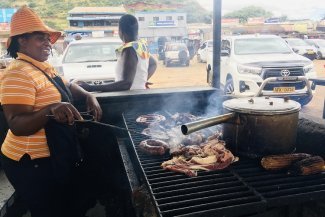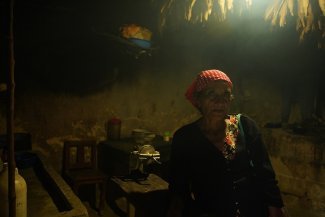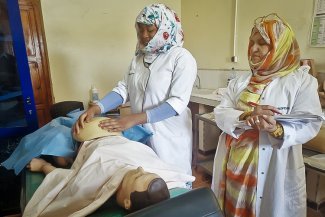Two men react to the news of Gustavo Petro’s victory in Colombia’s recent presidential elections. Bogotá, June 2022.
Agricultural innovation from scratch, entrepreneurship in the face of poverty, leading as a woman in traditional societies, and solving concrete problems on a local scale: this summer reading compilation brings together tales of ingenuity and resilience. This is a selection of uplifting stories that reject complacency and the negative focus that often characterises traditional news coverage.
Women in Lebanon’s refugee camps defy traditional roles by becoming community leaders
By Ethel Bonet
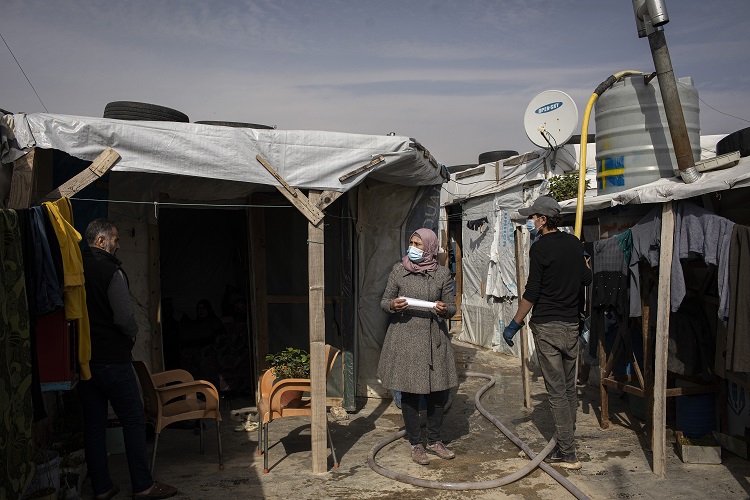
Hind Al-Ahamad is a woman brimming with energy and initiative. She has called on the children in the camp to sweep and collect the rubbish at the entrance to the tents and, whilst overseeing this task, she is sorting and counting the bags of bread that she is about to distribute to each refugee family, at the same time as talking on the phone with the water company, because the water tanker has not yet arrived.
Al-Ahamad is one of Lebanon’s first female shawish, the title given to those who run refugee camps there. It is a role traditionally held by men. But the deep economic crisis in the host country is changing the dynamic in the camps and more refugee women are taking on positions of responsibility and leadership roles in their communities.
It has not been easy for Al-Ahamad to get to where she is today. Until 2018, the idea of a female leader was unheard of in the camps in the Bekaa Valley in eastern Lebanon, where most of the refugees are concentrated, so she was under a great deal of pressure. First, she had to win the support and approval of her husband, who is working in Africa (for want of opportunities in Lebanon); then, she had to win the respect of the refugee community, which has a tribal structure – centred on the family and submission to the leader, who is always a man.
Roma resistance: dismantling anti-Roma racism in Spain
By María José Carmona

In February 2022, Spain took a step forward in the fight against anti-Roma racism. It incorporated the history of the Roma people into secondary school textbooks. The idea is to teach young people about past episodes of persecution and the keys to their culture, their symbols, their language and their contribution.
“It is a great achievement,” says Cortés. “We have to start talking about the history of the Roma people as a real and shared history.”
It has taken them years to achieve just that: “visibility”, something that has yet to be achieved in other areas such as popular culture.
This is what activist Vicente Rodríguez is arguing. Passionate about comics since he was a small child, at the age of seven, he discovered “that Magneto, an antagonist of the X-Men, was a gypsy and a Holocaust survivor”. Since then, pop culture is the area he has been moving in to help break with anti-Roma discourse.
He stirred a great deal of interest during the 2016 Comic Con, in New York, when he asked a group of cartoonists “why the Roma community wasn’t better represented in comics”.
The rise of a new generation of ‘green collar workers’ in South-East Asia
By Ana Salvá
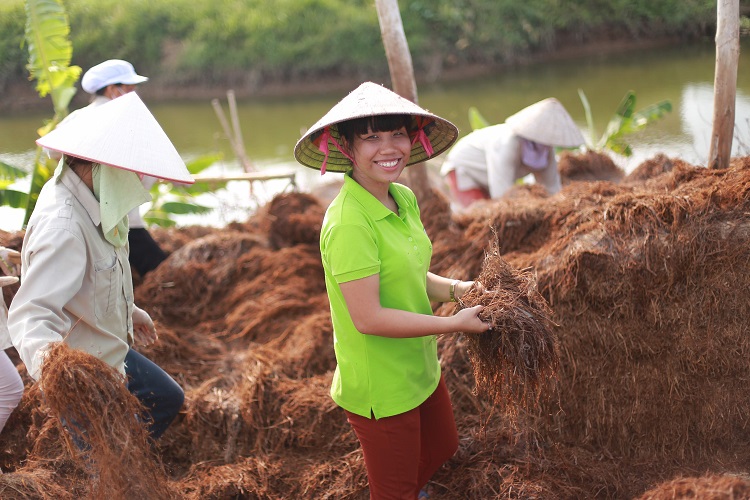
When she was younger, 34-year-old Tran Thi Khanh Trang never imagined that she would go into farming, but her passion for the environment led her to a sustainable development project in her native Vietnam that then spurred her to go into the sector. Further south, in Indonesia, 28-year-old Audria Evelinn is working to improve the local food system in her country, and, since retiring, 57-year-old Tosca Santoso has been involved in a reforestation and coffee-growing project.
Across Asia, many young, educated and master’s-level professionals from a variety of sectors are going back to their roots to create projects that can help the environment and support local communities.
It is a trend that James Chin, director of the Asia Institute at the University of Tasmania in Australia, says is not unique to this region, but is common in countries where there is a growing, and newly emerging, middle class, which is helping young people get a better education.
Five lessons from Martin Luther King’s ‘dream’ that apply to the global fight for decent wages today
By Ruth Vermeulen

OPINION | This coming Monday marks Martin Luther King (MLK) Day, a federal holiday in the United States to honour the iconic civil rights activist’s birthday. But as we celebrate his life and mourn his 1968 assassination, it is important to remember that the fight for a living wage and decent work are a significant part of his legacy and the wider human rights agenda that he served.
When Dr. King delivered his famous ‘I Have a Dream’ speech at the March on Washington for Jobs and Freedom in 1963, he envisioned a world where people would be truly free to experience racial, economic and social justice. A world where all workers have access to decent jobs that allow families and communities to live with dignity and respect. Well before the March on Washington, MLK sought an alliance with the labour movement; for example, in 1961, he addressed the AFL-CIO national convention and called for a need to unite all workers behind “decent wages, fair working conditions, liveable housing, old age security, health and welfare measures, conditions in which families can grow, have education for their children, and respect in the community”.
But what is the significance of MLK’s ‘social gospel’ for today’s business and human rights agenda? What lessons can MLK teach us to help us realise living wages in global supply chains, as well as socio-economic and racial justice in the United States and beyond?
In an impoverished hinterland of Brazil, inequality is fought with creativity and resilience
By Guilherme Oliveira and Morena Pérez Joachin
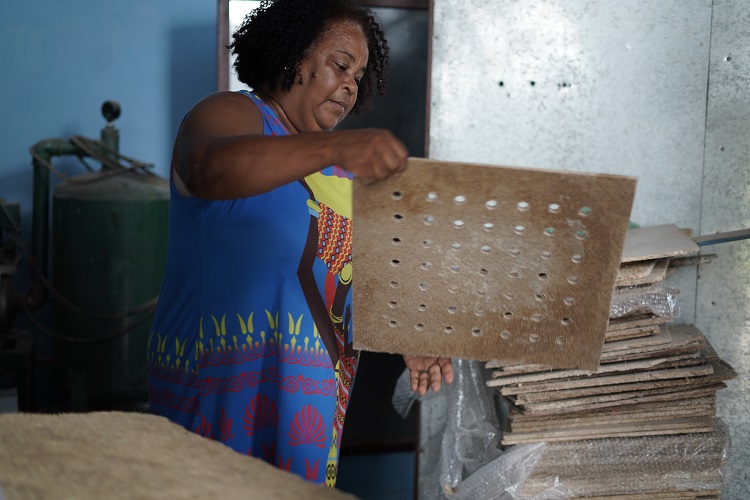
PHOTO REPORT | We sail across the clear waters of the Bay of All Saints in the direction of Praia Grande on Ilha de Maré. This island in the state of Bahia in northeastern Brazil is home to a ‘quilombola’ fishing community, or a rural settlement founded by descendants of enslaved people. Before arriving, we are welcomed by two large chimneys belching thick black smoke. Selma Jesús de Souza, a powerful woman of 60, waits for us on the shore.
Selma deferentially greets the members of her community that we come across on our walk. Rather than a leader, she describes herself as a “social counsellor” for her community. She is also an educator and master’s student at the nursing school of the Federal University of Bahia. She was the first quilombola woman to study there.
In the DRC, the production of reusable sanitary pads is improving hygiene and empowering women
By Moïse Makangara
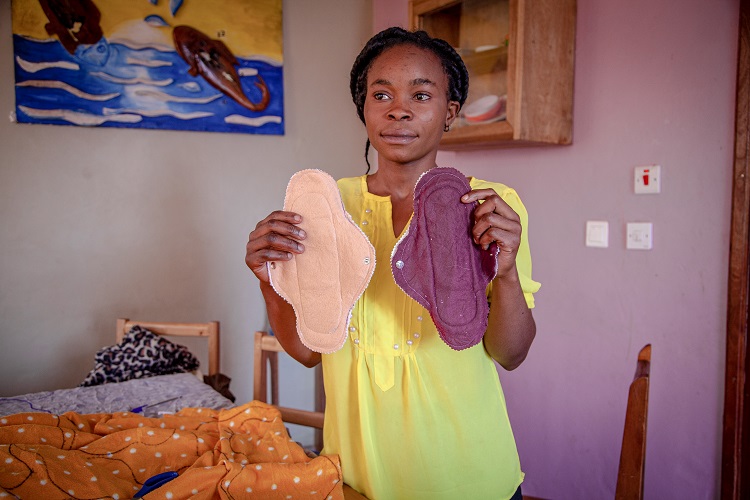
Divine Ntakobajira, a seamstress for the Uwezo Afrika Initiative, displays two Maisha Pads ready for use. September 2021, Bukavu, DRC.
As soon as you enter the workshop, you can see bags containing a large quantity of sanitary towels. On this September morning, 1,300 locally produced pads are ready to be delivered. “Today, we are only doing the cutting. We will set aside another day for sewing,” explains a seamstress to justify the noise of the scissors that can be heard in the room. This is where Maisha Pads, a range of reusable sanitary towels made from fabrics recovered from the local market in Bukavu, eastern Democratic Republic of Congo (DRC), have been manufactured since 2018.
“They are made from 100 per cent renewable cotton and polyester fibres, as well as absorbent and waterproof materials. They are cleaned before sewing, to ensure the towels do not cause illness,” explains Douce Namwezi, director of Uwezo Afrika Initiative, the non-governmental organisation (NGO) that launched the initiative. The Bukavu-based NGO campaigns for the empowerment of women and youth and for access to the right to sexual and reproductive health.
In the DRC, access to sanitary towels remains a headache for women. According to a U-Report survey, 31 per cent of respondents considered lack of money to be the main difficulty they faced during their periods.




